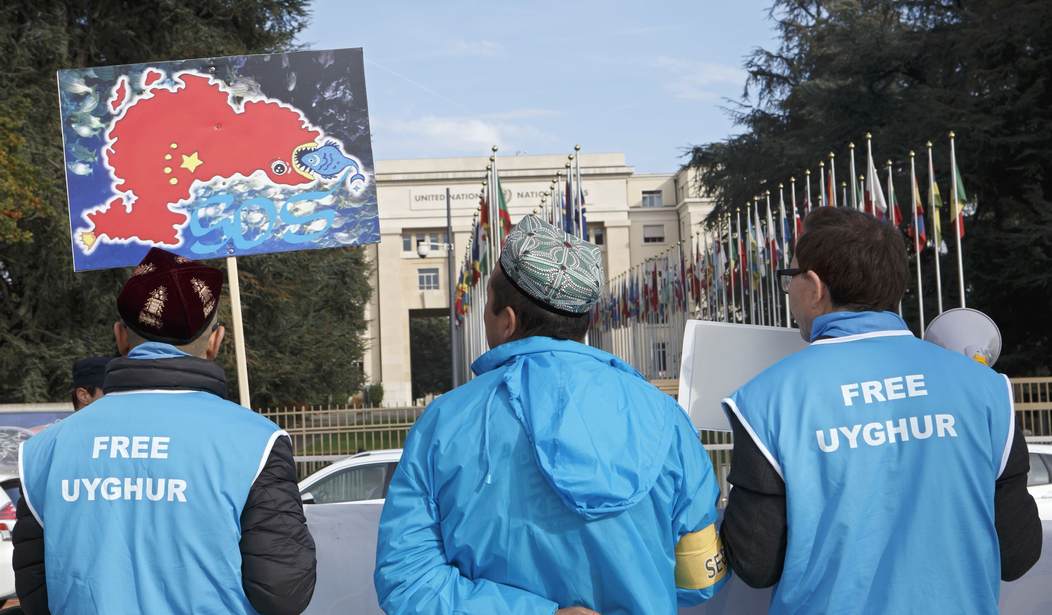In recent years many companies have embraced fair-trade practices, allowing Americans to buy products knowing they have been made in countries that protect workers’ rights. But every year millions of Americans still unknowingly wear or carry goods in their pockets made by the forced labor of religious minorities.
In 2020, the Australian Strategic Policy Institute identified 82 global brands where forced labor of Uyghurs—a Muslim minority in China’s Xinjiang province—is implicated. Some of the companies implicated include household names such as Apple, Microsoft and Nike. This is particularly concerning since the U.S. State Department has declared the activities taking place in Xinjiang to constitute genocide.
The report details how workers are taken from their homes in the Xinjiang region and distributed to factories throughout China. During the day they work at the factories under “military-style management,” while in the evenings they are forced to attend “patriotic education” classes. Insubordination bears the threat of the worker being sent to a “re-education camp” in Xinjiang.
America has tried to stop consumers from supporting the exploitation of Uyghurs. In December 2021 President Joe Biden signed into law the Uyghur Forced Labor Prevention Act, which builds upon the Uyghur Human Rights Policy Act of 2020. However, despite mounting evidence, the Chinese Communist Party’s (CCP) forced labor of the Uyghur people does not necessarily trigger the presumption clause of the act—which applies to “any goods, wares, articles, and merchandise mined, produced, or manufactured wholly or in part in . . . Xinjiang”—because individuals are transported to factories outside of Xinjiang.
Thankfully, religious and civil-society groups are stepping up to keep attention on the CCP’s egregious treatment of the Uyghurs. On June 28-30 leaders from around the world will gather in Washington for the International Religious Freedom Summit, where they will advocate for the Uyghurs and the many other most pressing threats to people’s right to belief. The summit will serve as a reminder to the CCP—and any other state that persecutes religious minorities—that intolerance will not be tolerated.
Recommended
The limitations of the Uyghur Forced Labor Prevention Act indicate that curbing the labor exploitation of religious minorities requires a more nuanced approach that considers aspects such as foreign investment. An example is to switch the target from products to resources that currently come from Xinjiang, such as cotton, tomatoes, coal, sugar, polysilicon, and various chemicals.
A resource of particular note is polysilicon, which is a key component in manufacturing solar panels. According to a report by consultancy Horizon Advisory, the growing solar energy sector in Xinjiang is connected to forced labor programs. Companies implicated in these programs include some of the world’s largest makers of polysilicon.
Thankfully, it seems some of the industry is starting to shift away from Xinjiang. As of December of last year, Daqo New Energy started to decrease its investment in Xinjiang. This follows an industry trend to invest in polysilicon projects outside of Xinjiang. According to Bloomberg, just 15% of polysilicon projects announced or under construction are in Xinjiang. However, this is still a substantial portion of the industry.
This is where legislation aimed at eradicating forced labor by religious minorities from supply chains can be applied to foreign relations and combined with foreign investment. To begin, investment in renewable energy enjoys broad support across party lines. Continued government spending, along with the Department of Energy’s recent goal of having a zero-carbon grid by 2035, guarantees the continued demand for solar panels and the polysilicon with which they are made.
Strategic investment in renewable energy materials produced by countries that respect religious freedom is also good for national security. Seven of the top ten companies producing polysilicon are based in China. If relations between the U.S. and China sour, this could lead to increased conflicts of interests between the supply of solar panels and American foreign policy objectives for China.
Consider what could happen if China decides to invade Taiwan, an American ally. The U.S. has good relations with Taiwan and would condemn a Chinese invasion of the country. However, the U.S. might be limited in its capacity to retaliate because of its dependence on Chinese companies. A timely example of this tension is the position Germany faced when Russia invaded Ukraine: Germany disapproved but was limited in its response because of its dependence on Russia for natural gas.
Foreign investment guided by religious freedom can open new business and diplomatic opportunities. Instead of buying polysilicon from China, America could redirect its investments toward building polysilicon plants in Africa, a continent that is rich in this resource. Here, too, we must consider how religious freedom would inform America’s approach.
As the most populous country in Africa, Nigeria is a strong candidate for American investment. However, violence in northern Nigeria, particularly against Christians, makes it unattractive both from foreign investment and religious liberty perspectives. Ethiopia, one of the fastest-growing countries in Africa, could be an option, but from a religious liberty perspective it still has a ways to go. On the Open Doors U.S.A. World Watch List, which ranks the worst countries in terms of religious liberty, from 2021 to 2022, Ethiopia improved slightly from 36thto 38th place.
On the other hand, Tanzania, another top-ranked country for growth, is not on Open Doors’ World Watch List, meaning that if there are concerns over religious liberty, they are likely not too severe. Given the economic favorability, and lack of religious persecution, Tanzania would be a preferred option for polysilicon production.
Religious liberty is perhaps America’s oldest ideal. Prioritizing it in our foreign relations and investments would make America safer.
Joshua Campbell is a third year student at Catholic University of America’s Columbus School of Law.























Join the conversation as a VIP Member